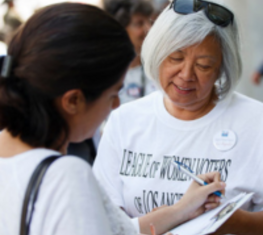Blog
A concerted global effort is needed to fight climate change, yet global commitments to reduce carbon emissions are inadequate and slow.
Local, regional, and state efforts are needed to step up the pace. Local governments have an important responsibility to move our communities in the right direction. And that requires a plan.
The fight for voting rights is ongoing. One way to fight for a stronger future is to make sure we're up to date on our history.
How well will you do in this quiz about voting rights?
In November 2022, the League sent delegates in person and virtually to observe the COP27 Climate Change Conference in Sharm El-Sheikh, Egypt. Experts highlighted ways in which climate change disproportionately affects women and girls, who are insufficiently represented in climate change response decision-making.
In a groundbreaking year, you rallied, donated, wrote representatives, and voted to defend a democracy in which all voters can safely and fairly make their voices heard.
Here are a few highlights.
Individual voter challenges occur when a person’s eligibility to vote is questioned. Across the country, ithey have been a vehicle for race- and language-based discrimination, election confusion, and voter suppression.
In the last decade, the US Supreme Court has severely weakened the Voting Rights Act of 1965, which was widely agreed to be the most influential civil rights law in our history.
This term, the Court considers Section 2 in Merrill v. Milligan (now Allen v. Milligan). It threatens to weaken a well-established precedent lower courts have used for decades to evaluate redistricting plans alleged to be racially discriminatory.
This blog explores the history of Section 2 and its impact on discriminatory redistricting plans, explains the dispute in Milligan, and previews potential next steps to protect voting rights.
In June 2022, Ketanji Brown Jackson — the first Black woman to serve on the US Supreme Court (SCOTUS) — was sworn in as an associate justice. Justice Jackson is the first former public defender to serve on the Court.
In the more than two centuries of the Court, no justice has come to the bench with a public defender’s experience, representing those charged with crimes who could not afford an attorney.
Naelyn Pike is a 23-year-old Chiricahua Apache. As a lifelong fighter, she continues to follow in her grandfather’s — the Apache Stronghold's founder — footsteps in protecting Apache's holy and sacred sites and Indigenous rights.
At the age of 13, Pike was one of the youngest people to ever testify before Congress when she spoke out against mining at Oak Flat, an Apache sacred site. Today, she continues to fight for environmental sustainability and Indigenous rights at the local, state, and national levels, battling corporations and political leaders through Indigenous spirituality. She firmly believes that the youth today give us hope for a better world for future generations.
Eligible voters deserve equal access to register and vote under the law. Increasing the language accessibility of voting materials allows voters to feel confident in voting and become educated and informed as they vote on high-priority issues in their communities. The Expanding the VOTE Act would do just this.
What does it mean when a state goes into a runoff election? We break it down.
Sign Up For Email
Keep up with the League. Receive emails to your inbox!
Donate to support our work
to empower voters and defend democracy.





